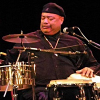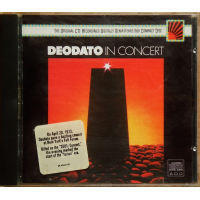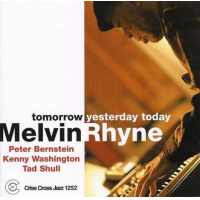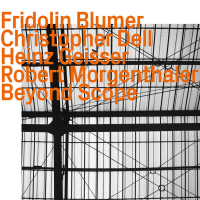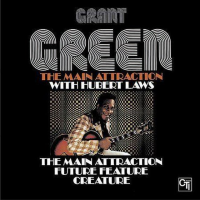Home » Jazz Articles » Liner Notes » Reggie Nicholson: No Preservatives Added
Reggie Nicholson: No Preservatives Added
Reggie's career, starting on Chicago's South Side in the late 1960s/early 1970s and extending after his decades of collaborations with leaders of the Association for the Advancement of Creative Musicians (AACM), among others, to international renown, has been much about bands, the vibrations that keep them together and drive them (although yes, he has also recorded two solo programs, Mettle and Percussion Peace). Early on he was into the era's top groups such as Earth Wind & Fire, Chicago, Ohio Players, Yes, Funkadelic and Grand Funk Railroad, Stevie Wonder and jazz instrumental hits like George Benson's "Breezin,'" Grover Washington, Jr.'s "Mister Magic" and Herbie Hancock's "Chameleon."
"My writing still has undercurrents of r&b," he says, "and expands on AACM principles." Having joined that unique musicians' community, emphasizing original musical directions and now boasting multiple generations of estimed, self-determining, performing and recording composer/improvisers, Reggie earned his chair in projects led Amina Claudine Myers, Edward Wilkerson Jr., Henry Threadgill and, after he'd moved to New York in 1987, the association's eminence Muhal Richard Abrams.
In the '90s Nicholson worked with Anthony Braxton, Thomas Chapin, Myra Melford and Lawrence Douglas "Butch" Morris, among others, and he's continued freelancing at a high level, even while teaching for almost 20 years at Evander Childs High School for Contemporary Arts, in the Bronx.
Yet Reggie had been honing his own approach since 1984, when he debuted his first compositions, for trio. In 1997 he released his first effort as Concept leader, Unnecessary Noise Allowed, introducing a cutting-edge quintet. Besides his two aforementioned solo programs, a color-coded Timbre Suite, the unclassifiable Electric Bro' and Surreal Feel for brass quartet and drums. On No Preservatives Added he uses traps, marimba, balafon and slot-drum, with mallet percussionist Bryan Carrott on gong, vibraphone and marimba, hand-percussionist Baba Don Eaton on bongos, conga, djembe, bells and various strikers, reeds and woods player Hanah Jon Taylor on tenor and soprano saxophones, flute and synthesizer flute on the track "Remote Distance."
"My 'concept' is to express how I feel, freely, my own way," Reggie says, "and I think on this recording we got that. I'm always going for a loose, 'jazzy' feel, half composed and half improvised—what might be called 'structured improvisation,' which I've had a lot of experience with, especially in AACM contexts. I admire other percussion ensembles, for instance Max Roach's M'Boom, but in this case was thinking more of what [vibraphonist] Bobby Hutcherson and [pianist-drummer] Joe Chambers did together [on their 1964 album Components]—not being rigid, and being especially aware of instrumental timbres.
"We had only one day of rehearsal, one day of recording at Dave Stoler's studio in Queens, and most of the tracks were done in one take," he continues. "Everybody was listening to everything, and played so deeply, so richly. It was a good day. I feel blessed to have done this, and proud to put it out."
Of the pieces, Reggie notes that "Time To Reset" is in a slow 5/4 meter, the gong marking each new measure, his traps the gently rolling ground over which Taylor's flute floats, while Eaton adds atmospheric details from shakers and rattles. "Sometimes I Wonder" is a showcase for Reggie's precisely powerful drumming and slot-drum flow (that's the third break), Carrott's spontaneous lyricism on vibes, Eaton's nuances and the three of them together—punctuated by Taylor's soprano sax bursts. On "Umoja," which means "unity" in Swahili, the four musicians revel in their musical bond, with a clear, strong message. The interplay of vibes and traps is splendid, as is Reggie's drumming under the tenor sax and djembe solos.
"Bryan and I have worked together a lot," Nicholson mentions, "often with Eli Fountain—you know, the percussion community in New York City is tight-knit. Baba has been on my earlier Concept albums, and is a mainstay with the Last Poets as well as with African dance troupes. Hanah and I go back to the 1980s. He lives in Madison, Wisconsin now, but I brought him to New York to record because I'd been thinking about his wound, wanting his sound, that Chicago-rooted sound."
I'll characterize the Chicago inflection as bold, broad and gutsy. Following Taylor's probing electronic foray "Remote Distance" the percussionists—Carrott on marimba, Nicholson on balafon (West African marimba), Baba playing a shaker and splash cymbal—reassert the core concept of rhythm and melody being one with "Di Ba Do." The start of "Road Runner" reminds me of the first swipes Bobby Hutcherson and Tony Williams make on Eric Dolphy's classic Out To Lunch ("I wasn't thinking of that," Reggie says, "but I'm flattered") and gives Taylor open space for his robust tenor, riding propulsion the drummer reins in when Carrott makes his cameo.
Nicholson switches to marimba on the "Suite Movements" in duet with Eaton's bongos until Taylor enters on soprano near the two-thirds point (that's Carrott on bass drum). "Land of the Contrasts" is more of the percussionists grooving together with manly grace. And "Say It Ain't So" strikes me as a conversation among confreres after a long, sweet night of jamming in familiar territory, like a neighborhood bar.
That track concludes this album with an air of intimacy that requires no pre-determined form in order to make its collective point. It's jazz (or "creative music") conjured from nothing more or less than the musicians' personal experiences and individual sensibilities. Their parts aren't pre-arranged to hang together, yet they arrive, unforced, at coherence, emphasizing that we're all in this together. That truth, the basis of all the music made by Reggie Nicholson's Percussion Concept, can, does and will continue to endure on its pure, unshakable strength alone—No Preservatives Added.
Liner Notes copyright © 2026 Howard Mandel.
No Preservatives Added can be purchased here.
Contact Howard Mandel at All About Jazz.
Howard is a Chicago-born writer, editor, author, arts reporter for National Public Radio, consultant and videographer. Visit Howard at howardmandel.com.
Track Listing
Time to Reset; Sometimes I Wonder; Umoja; Remote Distance; Di Ba Do; Road Runner; Suite Moments; Land of the Contrasts; Unquestionable; Say It Ain't So.
Personnel
Album information
Title: No Preservatives Added | Year Released: 2020 | Record Label: Self Produced
Tags
PREVIOUS / NEXT
Support All About Jazz
 All About Jazz has been a pillar of jazz since 1995, championing it as an art form and, more importantly, supporting the musicians who make it. Our enduring commitment has made "AAJ" one of the most culturally important websites of its kind, read by hundreds of thousands of fans, musicians and industry figures every month.
All About Jazz has been a pillar of jazz since 1995, championing it as an art form and, more importantly, supporting the musicians who make it. Our enduring commitment has made "AAJ" one of the most culturally important websites of its kind, read by hundreds of thousands of fans, musicians and industry figures every month.




